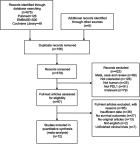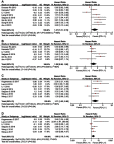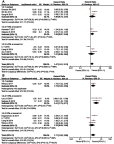Prognostic and clinicopathological value of PD-L1 in colorectal cancer: a systematic review and meta-analysis
- PMID: 31190869
- PMCID: PMC6526188
- DOI: 10.2147/OTT.S190168
Prognostic and clinicopathological value of PD-L1 in colorectal cancer: a systematic review and meta-analysis
Abstract
Purpose: The prognostic role of programmed death-ligand 1 (PD-L1) in colorectal cancer remains unclear. We employed a meta-analysis to explore the prognostic value of PD-L1 and to ascertain the relationship between PD-L1 expression and clinicopathological characteristics in CRC patients. Methods: We systematically searched PubMed, Embase and the Cochrane Library until October 2018. Eligible studies about colorectal cancer that pay attention to PD-L1 expression and studies reporting survival information were included. In order to evaluate the prognostic role of PD-L1 for overall survival (OS) and recurrence-free survival (RFS)/disease-free survival (DFS), Hazard ratio (HR) with 95% confidence interval (CI) was used. Odds ratio (OR) with 95% CI was selected to appraise the correlation between PD-L1 with clinicopathological characteristics of colorectal cancer patients. Begg's funnel plot was used to assess publication bias. Results: Twelve studies involving 4344 patients published from 2013 to 2018 were included in this meta-analysis. Pooled results revealed that PD-L1 overexpression was relevant to shorter OS (HR 1.47, 95% CI =1.01-2.15, p=0.04) and shorter RFS/DFS (HR 1.47, 95% CI =1.01-2.15, p=0.04). Moreover, Patients with high expression of PD-L1 associated with inferior tumor stage (OR=0.57, 95% CI: 0.45, 0.74, p<0.0001) and Vascular invasion-negativity (OR=0.75, 95% CI: 0.6, 0.94, p=0.01). But the expression of PD-L1 is not related to age, sex, tumor location, tumor differentiation, pT stage, pN stage, MSI/MMR status. Conclusion: This meta-analysis revealed that PD-L1 can serve as a significant biomarker for negative prognosis and the adverse clinicopathological features of colorectal cancer and could facilitate the better management of individual patients.
Keywords: PD-L1; colorectal cancer; meta-analysis; prognosis.
Conflict of interest statement
The authors report no conflicts of interest in this work.
Figures





Similar articles
-
Increased programmed death ligand-1 expression predicts poor prognosis in hepatocellular carcinoma patients.Onco Targets Ther. 2016 Aug 2;9:4805-13. doi: 10.2147/OTT.S110713. eCollection 2016. Onco Targets Ther. 2016. PMID: 27536144 Free PMC article.
-
PD-L1 Overexpression on Tumor-Infiltrating Lymphocytes Related to Better Prognosis of Colorectal Cancer.Clin Lab. 2020 Dec 1;66(12). doi: 10.7754/Clin.Lab.2020.200325. Clin Lab. 2020. PMID: 33337839
-
The Prognostic and Clinicopathological Roles of PD-L1 Expression in Colorectal Cancer: A Systematic Review and Meta-Analysis.Front Pharmacol. 2019 Feb 28;10:139. doi: 10.3389/fphar.2019.00139. eCollection 2019. Front Pharmacol. 2019. PMID: 30873025 Free PMC article.
-
Clinicopathologic Significance and Prognostic Value of Programmed Cell Death Ligand 1 (PD-L1) in Patients With Hepatocellular Carcinoma: A Meta-Analysis.Front Immunol. 2018 Sep 11;9:2077. doi: 10.3389/fimmu.2018.02077. eCollection 2018. Front Immunol. 2018. PMID: 30254644 Free PMC article.
-
Prognostic Value of Programmed Cell Death Ligand-1 Expression in Nasopharyngeal Carcinoma: A Meta-Analysis of 1,315 Patients.Front Oncol. 2019 Oct 25;9:1111. doi: 10.3389/fonc.2019.01111. eCollection 2019. Front Oncol. 2019. PMID: 31709181 Free PMC article.
Cited by
-
New Potential Immune Biomarkers in the Era of Precision Medicine: Lights and Shadows in Colorectal Cancer.Life (Basel). 2022 Jul 28;12(8):1137. doi: 10.3390/life12081137. Life (Basel). 2022. PMID: 36013315 Free PMC article. Review.
-
Immunotherapy with immune checkpoint inhibitors in colorectal cancer: what is the future beyond deficient mismatch-repair tumours?Gastroenterol Rep (Oxf). 2019 Nov 25;8(1):11-24. doi: 10.1093/gastro/goz061. eCollection 2020 Feb. Gastroenterol Rep (Oxf). 2019. PMID: 32104582 Free PMC article. Review.
-
The Enhanced Inhibitory Effect of Estrogen on PD-L1 Expression Following Nrf2 Deficiency in the AOM/DSS Model of Colitis-Associated Cancer.Front Oncol. 2021 Jul 8;11:679324. doi: 10.3389/fonc.2021.679324. eCollection 2021. Front Oncol. 2021. PMID: 34307147 Free PMC article.
-
The Potential of PD-1 and PD-L1 as Prognostic and Predictive Biomarkers in Colorectal Adenocarcinoma Based on TILs Grading.Curr Oncol. 2024 Nov 25;31(12):7476-7493. doi: 10.3390/curroncol31120552. Curr Oncol. 2024. PMID: 39727675 Free PMC article.
-
Clinical implications of PD-L1 expression and pathway-related molecular subtypes in advanced Asian colorectal cancer patients.Am J Cancer Res. 2024 Feb 15;14(2):796-808. doi: 10.62347/FSSF9938. eCollection 2024. Am J Cancer Res. 2024. PMID: 38455414 Free PMC article.
References
Publication types
LinkOut - more resources
Full Text Sources
Research Materials

